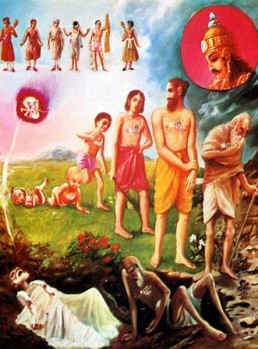Swami Chinmayananda Commentary
From this stanza onwards we have a beautiful presentation of the whole problem of Arjuna from the stand-point of the man-of-the-world. In these ten verses Krishna explains the problem as viewed through the goggles of a common man of the world and valued by his intellectual judgement.
The material world of objects strictly follows the law of causation. The world of “effects” rises from the world of “causes.” In a majority of cases, the effects are manifest and the causes are unmanifest. ‘To project from the unmanifest to the manifest’ is the programme of creation of a thing, strictly following the Law of Causation.
Thus, the manifest-world of today was unmanifest before its creation; and now for the time being, it is available for cognition as fully manifest, only to fade away soon into the unmanifest again. It amounts to saying that the present came from the UNKNOWN and shall return to the UNKNOWN. Even if viewed thus, why should one moan; for, the spokes of a wheel that turns eternally must COME DOWN only to RISE UP again.
Again, the dream-children, unmanifest before, and which came to manifestation during the dream, become unmanifest again on waking up. Why moan, you bachelor, for a wife whom you had never married, who had disappeared with your dream, the children unborn, who dissolved away with your dream?
If there be, as Krishna says, an Infinite, Eternal, Truth which is Changeless and Deathless, in which alone this drama of change occurs, this whirl-of-birth-and-death spins, how is it that we are not able to realise It even though it is explained to us repeatedly? According to Shankara, Lord Krishna here feels that He should not blame Arjuna for his incapacity to understand the Self.
SHANKARA SAYS, “THE SELF JUST SPOKEN OF IS VERY DIFFICULT TO REALISE. WHY SHOULD I BLAME YOU ALONE, WHILE THE CAUSE, IGNORANCE, IS COMMON TO ALL?” ONE MAY ASK: HOW IS IT THAT THE SELF IS SO DIFFICULT TO REALISE? THE LORD SAYS:
Adi Sankara Commentary
It is not reasonable to grieve even for beings which are constituted by bodies and organs, since ‘all beings remain unmanifest’ etc. (Bharata, O descendant of Bharata;) bhutani, all beings, avyaktaduni, remain unmainfest in the beginning. Those beings, viz sons, friends, and others, constituted by bodies and organs, [Another reading is karya-karana-sanghata, aggregates formed by material elements acting as causes and effects.-Tr.] who before their origination have unmanifestedness (avyakta), invisibility, nonperception, as their beginning (adi) are avyaktaadini. Ca, and; after origination, before death, they become vyakta-madhyani, manifest in the middle. Again, they eva, certainly; become avyakta-nidhanani, unmanifest after death. Those which have unmanifestness (avyakta), invisibility, as their death (nidhana) are avyakta-nidhanani. The idea is that even after death they verily attain unmanifestedness. Accordingly has it been said: ‘They emerged from invisibility, and have gone back to invisibility. They are not yours, nor are you theirs. What is this fruitless lamentation!’ (Mbh. St. 2.13). Ka, what; paridevana, lamentation, or what prattle, can there be; tatra, with regard to them, i.e. with regard to beings which are objects of delusion, which are invisible, (become) visible, (and then) get destroyed!
The Bhagavad Gita with the commentary of Sri Sankaracharya – Translated by Alladi Mahadeva Sastry
Holy Geeta – Commentary by Swami Chinmayananda
The Bhagavad Gita by Eknath Easwaran – Best selling translation of the Bhagavad Gita
The Bhagavad Gita – Translation and Commentary by Swami Sivananda
Bhagavad Gita – Translation and Commentary by Bhaktivedanta Swami Prabupadha
Srimad Bhagavad Gita Chapter 2 – Verse 28 – 2.28 avyaktadini – All Bhagavad Gita (Geeta) Verses in Sanskrit, English, Transliteration, Word Meaning, Translation, Audio, Shankara Bhashya, Adi Sankaracharya Commentary and Links to Videos by Swami Chinmayananda and others – 2-28

